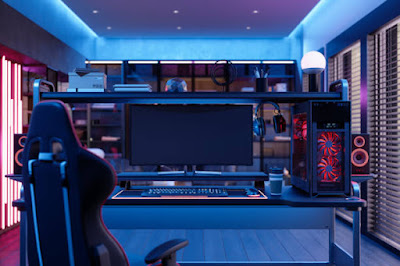Enhancing PC Performance: Adding 8GB RAM (2x4) to 16GB RAM (2x8) gaming PC bundle
TL;DR:
Gaming PC bundle Your RAM slots aren't
channels. Most motherboards have 2 RAM slots per channel.
If your motherboard supports 4 memory
channels, adding 2x4GB can enhance your PC's performance, unless you have a
very old motherboard (e.g., DDR2). In such cases, stick with 2x8GB or upgrade
to 4x8GB.
For mainstream motherboards with 4
memory slots and 2 channels, adding 2x4GB can boost your PC, provided the new
RAM isn't significantly slower than your current one or your CPU's memory
controller can't handle the added RAM speed.
Full Answer:
Upgrading your PC's RAM configuration
is a smart move if your motherboard supports quad-channel RAM and flex mode.
This enhancement can lead to an overall performance boost gaming PC bundle.
With 2x4GB added to your setup, you'd create a 24GB flex-mode configuration,
with 16GB operating in quad-channel mode and the remaining 8GB in dual-channel
mode once the quad-channel capacity is exhausted.
However, if you're using an older
quad-channel DDR2 motherboard, like an Intel S5400SF server motherboard, it
might not support flex mode. In such cases, it's generally recommended to stick
with 2x8GB. Installing modules of different capacities in these motherboards
could lead to compatibility issues, potentially rendering your PC inoperable or
forcing it into single-channel mode for the entire RAM capacity.
Typically, only motherboards designed
for "HEDT" (High-End DeskTop) workstations and servers offer more
than 2 memory channels. These high-end motherboards often come with 8 RAM
slots. In cases where you install 4 memory modules into a modern dual-channel
motherboard, it will still run in dual-channel mode, but the extra memory
capacity can be beneficial.
If you currently have 2x8GB in
dual-channel mode, you can install two 4GB modules into the empty RAM slots to
reach 12GB in each memory channel, creating "full" dual-channel mode.
This setup also offers a latency reduction due to data interleaving between the
two modules within each channel, enhancing performance.
To achieve a similar benefit of
interleaving, you can opt for dual-rank RAM modules. Dual-rank RAM modules
contain two rows of chips (usually one on each side). Each rank/row of chips
functions as an independent module gaming PC bundle. In mainstream
motherboards, you can have up to 4 ranks of memory in each channel by
installing 4 dual-rank modules. While all 8GB DDR3 desktop RAM modules are
dual-rank, some older DDR4 modules also fall into this category. However, it's
essential to check the rank configuration, which is not always specified for
high-end gaming RAM.
Matching the transfer rate (advertised
MHz) and CAS Latency (CL) of your RAM is crucial. By default, all your RAM will
run at the speed of the slowest module. High-voltage/gaming RAM may initially
default to a slow JEDEC speed profile when you install more RAM. In such cases,
you'll need to access the BIOS to enable the XMP/DOCP/EXPO speed profile or
manually configure the RAM to the correct transfer rate, latency, and voltage.
Note that some laptops and prebuilt desktop PCs (e.g., most Dell PCs) may not
allow you to adjust RAM speed or voltage settings, limiting you to a slow JEDEC
RAM speed.
Additionally, if your CPU has a weaker
memory controller and your RAM is relatively fast gaming PC bundle, adding more RAM
modules may lead to instability or booting issues. The interleaving of data
between modules reduces latency but also increases the load on the memory
controller. If your memory controller can't handle it, you might experience
errors. In such cases, underclocking the RAM can provide stability but may
reduce RAM bandwidth.
CPU memory controller performance can
vary, even among the same model of CPUs. For instance, while most Ryzen 5 1600
CPUs can work with 1 module per channel at DDR4–3200, they may struggle with 2
modules per channel at the same speed, especially if the modules are dual-rank.
However, some Ryzen 5 1600 CPUs can handle 4 RAM modules at DDR4–3200 without
issues.
Building the Ultimate PC for Lag-Free
Space Engineers Gameplay"
If you're an avid Space Engineers
player and you're tired of lag disrupting your interstellar adventures, it's
time to consider building a PC that can handle the game's demanding
requirements. Space Engineers offers both minimum and recommended system
specifications, but to truly eliminate lag, you'll want to focus on key
components, especially the processor.
Minimum
Requirements:
DirectX: 11
Hard Drive: 25 GB free HDD space
Sound Card: DirectX® compatible
on-board
Recommended Requirements:
Memory: 16 GB RAM
DirectX: 11
Hard Drive: 25 GB free HDD space
Sound Card: DirectX® compatible
on-board
Now, let's focus on the key
differentiator between these two sets of requirements: the processor.
The Processor Makes the Difference:
In contrast, the recommended setting
suggests an Intel Quad Core i7 running at a blistering 4.5 GHz or its AMD
counterpart. This processor boasts four cores, each clocked at 4.5 GHz,
resulting in a combined processing power of 18 GHz. That's triple the
processing power compared to the minimum requirement.
While upgrading your RAM can provide
some benefits, especially when dealing with complex structures in the gaming Pc bundle, it's clear that
the processor is the primary bottleneck in Space Engineers. Investing in a
powerful processor will significantly enhance your gameplay experience.
Conclusion:
To ensure a lag-free and enjoyable
Space Engineers experience, allocate your budget wisely when building your
gaming PC bundle. While meeting the minimum requirements is possible, upgrading
to a quad-core processor, as recommended, will provide you with the processing
power needed to handle the game's demands seamlessly.
Whether you're constructing vast space
colonies with friends or facing off against swarms of kinetic drones, a
powerful processor will keep your gameplay smooth and exhilarating, without the
frustrating interruptions caused by lag spikes. So, when building your ultimate
Space Engineers PC, remember that more processor power means more gaming fun.



.jpg)



